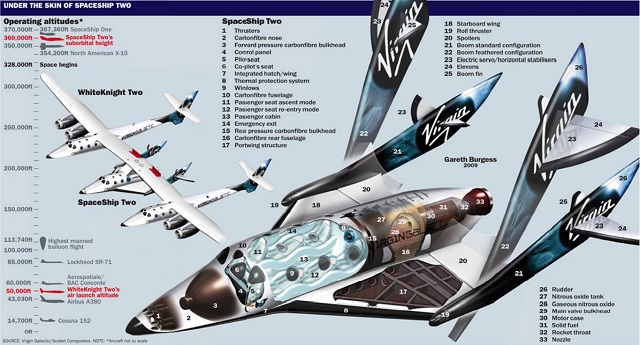
Leaving planet earth in crisis is a terrible idea?
| THE INDEPENDENT | The four minutes billionaires Sir Richard Branson and Jeff Bezos spent in a state of weightlessness on the edge of space recently were historic feats in the burgeoning space tourism business, but many critics say Branson, Bezos and other billionaires are missing the mark by looking to the stars, leaving behind a planet rife with problems that big investments might be able to fix.
Branson, 71, traveled about 80km above the Earth’s surface on his Virgin Galactic spacecraft as part of an effort to “evaluate the private astronaut experience” on July 11, beating out fellow billionaire Jeff Bezos in the race to escape the Earth’s atmosphere.
Bezos, the world’s richest man, head to space on his Blue Origin craft on July 20 and travelled farther from Earth’s surface than Branson—some 100km.
The U.S. Department of Defense does not consider one an astronaut; a person who has travelled beyond the earth’s atmosphere, unless you cross the 100km line. That line is called the Kármán line named after Theodore von Kármán, a Hungarian American engineer who was the first person to attempt to derive the boundary between the earth’s atmosphere and space.
Today, it is agreed that the shortest distance between earth and space is about 100km straight up, which by general accord is where the earth’s boundary ends and suborbital space begins. The moon is on average about 385,000km from earth.
For comparison, although there are exceptions, most commercial jets fly at around 7 to 11km above ground. That is within the earth’s troposphere; the lowest level of earth’s atmosphere between the earth’s surface and the stratosphere. The troposphere is between 7km and 20km — depending on the season and latitude. Above the troposphere is the stratosphere, followed by the stratosphere and then the mesosphere and thermosphere where that atmosphere ceases.
But the U.S. Federal Aviation Administration is more lenient; granting you astronaut wings at 80km, which may as well be called the Branson Line.
Bezos was accompanied by Mark Bezos, his brother, Wally Funk, an 82-year-old pioneer of the space race, and Oliver Daemen, an 18-year-old student.
Another billionaire, Elon Musk, has not announced plans on shooting himself away from Earth (yet), but his company—SpaceX—is widely considered the leader in the private space industry, and Musk has made it known his top priority is to make humans an “interplanetary species.”
Critics point out the big-money focus on space is coming at an especially vulnerable point on Earth—where the Covid pandemic is still causing widespread death while historic heat waves prompt concerns global warming has reached a dangerous new level.
The United Nations has also repeatedly warned widespread famines could come to poor nations as a result of the pandemic, and the UN released a report on July 05 finding 811 million were undernourished during 2020.
“Is anyone else alarmed that billionaires are having their own private space race while record-breaking heatwaves are sparking a ‘fire-breathing dragon of clouds’ and cooking sea creatures to death in their shells?” former U.S. Labor Secretary Robert Reich tweeted on July 08.
Branson’s brief trip to space wasn’t totally without scientific merit. Sirisha Bandla, Virgin Galactic’s vice president of government affairs and research operations, flew with Branson on July 11 and conducted an experiment on plant gene expression. The experiment itself was also a test of whether scientific research is feasible on Virgin Galactic’s spaceflights. Based on Bandla’s account after landing, her mission was a success.
Key Background
The driving force behind space travel has shifted away from its long history of massive government projects to private industry over the past few years.
SpaceX’s May 2020 launch of two NASA astronauts from Kennedy Space Center in Florida marked the first manned launch from U.S. soil since 2011, with SpaceX becoming the first private company to send astronauts to the International Space Station during the same mission.
Musk’s company has since been chosen as the sole company that will create spacecraft for NASA’s upcoming Artemis mission to send astronauts back to the Moon, beating out Blue Origin for the contract.
But the shift to privatisation has not just put billionaire’s companies at the forefront of scientific achievements—it’s accelerated the push for space tourism programs, which for now come with price tags solely restricted to the ultra-wealthy. There’s also already been talk of luxury space hotels.
Orbital Assembly Corp. announced plans earlier this year for a 280-guest hotel called Voyager Station, which it said will open in 2027. The company hopes to work with SpaceX as a partner on the project.
Big Number
US$$6 billion. That’s how much money it would take to save 41 million people set to die of hunger this year worldwide, according to UN World Food Program Executive Director David Beasley. Beasley sent a tweet late last month urging Musk, Branson and Bezos to team up to fight hunger, saying, “We can solve this quickly!”
A widely shared petition asking for Bezos to not be allowed to return to Earth gathered more than 150,000 signatures. “Billionaires should not exist . . . on earth, or in space, but should they decide the latter, they should stay there,” the petition’s creator said on change.org.
****
The post Billionaire’s space race appeared first on The Independent Uganda:.
from The Independent Uganda: https://ift.tt/3726VBF
0 Comments